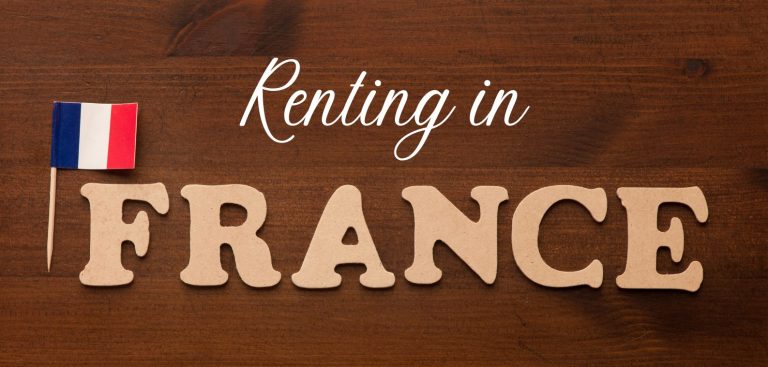
Renting in France : all you need to know as foreigners !
You decided to settle in France and you wonder what’s a “bail” or a “dépôt de garantie” ? Don’t worry, we are here to help you ! The first thing you need to know to understand the real estate rental market in France, is that tenants are particularly protected by the law. This explains why owners and agencies are particularly careful when they choose a tenant.
It’s especially true in Haute-Savoie, particularly in Annecy because the market is tight due to the fact that demands exceeds the offers, it induces that owners are more and more selective on the guarantees that tenant can give them.
Thus, there is a lot of competition: for every accommodation available, there are most of the time several applicants. And when an accommodation is put on the market, it is usually rented in the following days, so there is not a lot of time to think to long or ask for a second visit! This is less true for big apartments (more than 90 m2) and furnished ones.
GOOD TO KNOW
What documents are required for my rental file ?

You found the accommodation that matches with your criteria and you want to submit your file to the lessor (landlord/agency), here are the documents you generally have to provide :
- ID card or passport ("carte d'identité" or "passeport")
- 3 last rent receipts ("quittances de loyer") or property proof / tax
- Proof of employment ("attestation d'employeur") or work contract ("contrat de travail")
- 3 last payslips ("bulletins de salaire")
- Last tax return ("avis d'imposition")
+ If the landlord so requires, the agreement of a guarantor who undertakes to pay the rent should you no longer be able to do so.
I’m asked to have a guarantor (“Garant”), what are my options ?

A guarantor is a person or an organization who is legally responsible towards the landlord in the event of a default from the tenant.
Because landlords want to rent their apartment to secured tenants, they ask a guarantor if the renter :
- Is a student.
- Is not a French citizen.
- Has no revenues in France.
- Is in a trial period.
- Has a limited-period contract or unstable revenues.
- Earns less than 3 times the rent.
If your guarantor is a person, he also has to earn at least 3 times the monthly rent and must have a French unfixed-term employment contract (“CDI” in French). He will have to send to the lessor the same documents as the tenant and sign a surety bond.
If you don’t have the possibility to have un person for guarantor, there are other solutions for you :
The Garantme Guarantee is the same legal nature as a the bond of a physical person.
It is a very useful private guarantor when you arrive in France from abroad and that you don’t have physical guarantor.
The price of the Garantme service varies depending on the rent and the number of tenants.
The VISALE guarantee is a rental deposit granted by Action Logement.
It guarantees the payment of rent and rental charges to your landlord in the event of default in payment.
Free, it aims to facilitate your search for accommodation by insuring the lessor but it is granted subject to being eligible (depending on age and income).
Agencies tell me that the accommodation they offer is often subject to an unpaid rent guarantee, what is this?
As told above, tenants are particularly protected in France, even in cases of non-payment of rent ; the procedure to expel them can take months sometimes.
That is why more and more owners choose to subscribe to an unpaid rent guarantee : “Garantie Loyers Impayés” “or “GLI” in French. This insurance taken out by the owners to ensure them to receive an amount equal to their rents even if their tenant does not pay them.

What that means concretely to you if the accommodation you apply for is under the guarantee ?
If the accommodation is under the unpaid rent guarantee, your file will not be accepted if you do not have a French confirmed permanent employment contract (CDI without trial period), or if one of the documents in the list above is missing, which is often the case for expatriates who don’t have a French tax notice yet for example.
However, some GLIs accept Swiss employment contracts (permanent ones).
Why do I pay agency fees ?

Some landlords rent out their property on their own, others use the services of an estate agent.
If the property you have chosen is rented through an agency, you will have to pay an agency fee.
These fees depend on the size of the property and the geographical area, and may differ between agencies, but there is a legal limit on the maximum amount that can be charged.
These fees cover the services offered by the agency, such as visiting the property, putting together the tenant’s file, drafting the lease and carrying out the initial inspection.
These agency fees are payable on the day the lease is signed.
The rental fees paid by the tenant may not exceed the following limits :
- 3 € / m2 for the establishment of the inventory of fixtures on arrival ;
and for other types of fees (excluding the inventory of fixtures) :
- 12 €/m2 in areas with a very tight rental market (mainly Paris and its suburbs) ;
- 10 €/m2 in areas with a tight rental market (notably Annecy and the Swiss border area ;
- 8 €/m2 in other zones.
What is the security deposit used for ?

The security deposit can be used to cover potential degradations of the accommodation once you leave the place. This can represent up to one month’s rent, excluding charges, for an unfurnished apartment, and two for a furnished one.
It is giving back to the tenant when he leaves the accommodation, the amount eventually retained on the security deposit depends on the type of degradation. If the deposit is returned in full, the owner or agency have one month to return it to you, if a deduction is made, it has up to two months to return your deposit.
Finally, I'm signing my lease !

The lease is a contract between the tenant and the lessor (agency or landlord).
The furnished lease is for 1 year, the unfurnished lease is for 3 years. But don’t worry, this doesn’t mean that you will be obliged to leave the property at the end of this period or that you can’t leave it earlier.
If the owner wants to sell the property or make it his or her main residence, he or she must inform you at least 6 months before the end of the unfurnished lease, and 3 months for a furnished lease.
The lease is automatically renewed if the owner or the tenant have not expressed their wish to end it.
If you sign the lease before the inventory of fixtures, you start paying rent from the date written on the lease and not on the day you get the keys.
What does the initial inventory of fixtures consist of ?

The inventory of fixtures must be carried out when the keys are handed over and must be attached to the rental contract. This document describes the state of the accommodation and its equipment when the tenant enters.
A new inventory will be carried out when the tenant leaves the property and returns the keys. In the event of a dispute, a comparison of these two documents will establish the responsibilities of each party.
One last thing before I get my keys !
The security deposit, the agency fees and the first month’s rent must be payed before you get the keys.

You also need to subscribe to an home insurance before getting in the accommodation and give a copy of your insurance certificate to the owner, you have to send the a new certificate each year, it is mandatory.
I want to leave my accommodation ? What should I do to inform the lessor ?
To leave your home, you must give your landlord or agency notice to leave. This letter must be sent with acknowledgement of receipt or delivered by hand.
You must send it at least 1 month before you leave if :
- You are in a high pressure area,
- You have signed a furnished lease.
Otherwise, it is 3 months before departure if you are in a non-tensioned zone.
If you do not know in which zone your accommodation is located, you can check on this page of the official website of the French administration, by entering the postcode of your accommodation : https://www.service-public.fr/simulateur/calcul/zones-tendues





